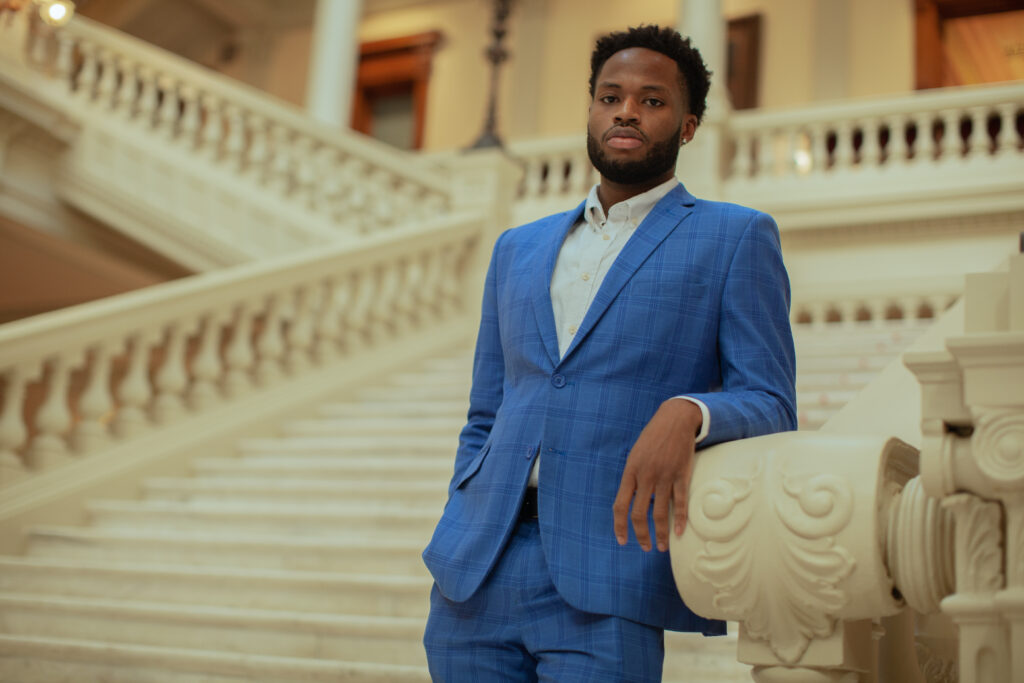A framed photo of Martin Luther King Jr. and Ralph Abernathy on the first desegregated bus ride after the Montgomery Bus Boycott ended hangs on the wall of Georgia state Rep. Bryce Berry’s office. It was a graduation gift Berry brought with him to the Georgia State Capitol when he was sworn in this year as the state’s youngest lawmaker and the only active educator serving as a state representative.
When he took office earlier this year, Berry, 23, set an intention to keep himself grounded in what he had learned from history, community organizing and his people. Berry hung the photograph of King and Abernathy in his office as a reminder that progress, however slow and gradual, requires unwavering commitment.
“But eventually, you get a picture like that,” he said. “They walked for over 365 days. They walked, they carpooled, they took taxis. They created this whole system. And I’m sure there were days they thought they were never going to have an integrated bus system, but that day came.”
Berry was born in St. Louis, Missouri, and spent summers in Atlanta with his family. In 2019, Berry moved to Atlanta to attend Morehouse College. When former state Rep. Mesha Mainor of District 56 left the Democratic Party to join the Republican Party, Berry began getting calls from people asking him to run for her seat. Berry is the first to say he had no plans to run for office.
“I had just gotten out of college,” he said. “At the time, I was 22 years old. I was like, ‘No, I am definitely not running.’”
Black Lives Matter
His heart was always in community organizing. He got his start at 13 after a police officer killed Michael Brown in Ferguson, Missouri, a suburb of St. Louis, just blocks from Berry’s childhood home.
“I remember very vividly, when we were marching, there were snipers on the roof,” Berry said. “We were kids marching and there were snipers on the roof. I remember the day the QuikTrip burned down. I remember the pain. I will never forget the cry from Michael Brown’s mom when she heard that they were not going to indict Darren Wilson for killing Michael Brown. That is a cry I never want to hear again. I remember it all.”
Berry got involved in the Black Lives Matter movement in Ferguson, joining organizers leading the call to end police violence.
“I kind of always wanted to stay with organizing,” he said. “I was the man on the ground. I was on the streets. That is where my heart was.”
Berry’s perspective changed, though, after he became an educator in Georgia. He taught students who experienced gun violence, homelessness and other trauma at a young age. His decision to run for office was motivated by a desire to materially change for the better his students’ lives, in ways he could not as a middle school math teacher in Atlanta.
“These students are growing up in a world and growing up in a state that they can clearly already tell at age 12 doesn’t see them, doesn’t invest in them, and doesn’t care about them, frankly,” Berry said. “That was my last straw.”
‘From the streets to the Capitol’

During his campaign, Berry focused on ensuring that a single job can cover living expenses, investing in public education and expanding Medicaid. He apparently won over voters on those issues. In the November election, he defeated Mainor in a landslide victory with more than 80% of the vote.
After swearing into office in January, he began the legislative session while still actively teaching in the classroom. He spent winter break planning lessons, planning for days he needed a substitute teacher, and, eventually, for a leave of absence when the session would consume most of his time.
“The one line I’ve always drawn is that I will not leave my students behind,” Berry said. “There will be a constant continuity of learning, and I’m going to make sure my kids are getting stuff done and continue learning.”
Education is, of course, a top policy priority for Berry. He said he plans to focus on making it easier for school counselors to transfer their out-of-state certification to Georgia, increasing funding for counselors, requiring private schools to accept students’ Individualized Education Programs (IEPs), capping classroom sizes, increasing funding to public schools with economically disadvantaged students, funding remediation services for literacy and math, expanding the HOPE Scholarship program to include historically Black colleges and universities (HBCUs), increasing teacher pay to account for inflation, and many other issues.
“I know it’s very, very ambitious,” Berry said. “But I want to be a model for how we move forward with education policy nationwide.”
In Georgia, Berry said he knows he is in the minority both by race and ideology in a system that is “fundamentally broken” and designed to keep him out. He acknowledges that shifting from organizer to politician means negotiating the inevitable tension between the uncompromising demands of grassroots movements and the political realities of governance.
“I understand there’s deep distrust in the system,” he said. “Hell, I distrust the system. I’m now a member of the system, and I still don’t trust the system. Every day I walk through these doors, I’m walking through doors that slaves literally built. I’m walking through the doors where the first elected African Americans were expelled for the simple reason of being Black. I understand that the system is fundamentally broken, and it’s constantly the job of the people to attempt to make it better.
“It’s absolutely weird going from the streets to the Capitol, but I keep reminding myself of why I do what I do,” Berry said. “I thought I was the best person to get the job done for my students. And as [the late U.S. Rep.] Shirley Chisholm [said], I will be unbought and unbossed by having some integrity and courage to do what is right even when I might be the only one.”
‘Feel seen through me’
Berry exemplifies the kind of transformative leadership that the people of Georgia need to meet the moment, said Yterenickia Bell, the Georgia state office director for the Southern Poverty Law Center.
“His organizing background coupled with his community-informed policy agenda clearly illustrates his investment in the future of our state by prioritizing education,” Bell said, adding that the SPLC’s Georgia state office is working with Berry “to ensure educational equity” for Black and Brown people.
SPLC Georgia Policy Director Isabel Otero said Berry is an example for young people who want to do social change work.
“Anyone can find or create space for themselves in this work,” she said. “Rep. Berry has made history by showing us that young people can make and follow their own paths to best serve their communities.”
Otero said Berry’s journey to the Georgia General Assembly highlights the “immense value of organizing experience in shaping effective leadership.”
“Understanding how to build power and mobilize communities is essential for policymakers who truly want to effect change,” Otero said. “The skills gained through grassroots efforts — strategic thinking, coalition-building, developing strong relationships with your neighbors and community members — those skills are necessary for anyone seeking to lead with accountability and vision.”
However, Berry said, representation in leadership does not necessarily mean political candidacy.
“My piece of advice for folks that don’t see themselves in the system is that you don’t have to run for office,” Berry said. “I think often we equate being seen in the system with running for office. But what you can do is run a campaign. You can go knock doors and organize for causes and issues that make you feel seen.”
Berry encourages those who are considering running for office to make space for themselves and to bring others along.
“I talk to young Black men and Black boys so they can feel seen through me,” Berry said. “Teachers, I want them to feel heard through me. Organizers, I want them to know that I’m still on their side and they have a vote with me. My generation, same thing. I’m on their side, and they have a vote with me. I would highly encourage folks that are looking to break into [politics] to look back and see who you can bring with you and who you can let feel seen through you.”
Image at top: Georgia state Rep. Bryce Berry points toward portraits of famous Georgians circling the rotunda walls of the Georgia State Capitol. Berry, a middle school math teacher, was sworn in as the state’s youngest legislator in January. (Credit: Myisa Plancq-Graham)



